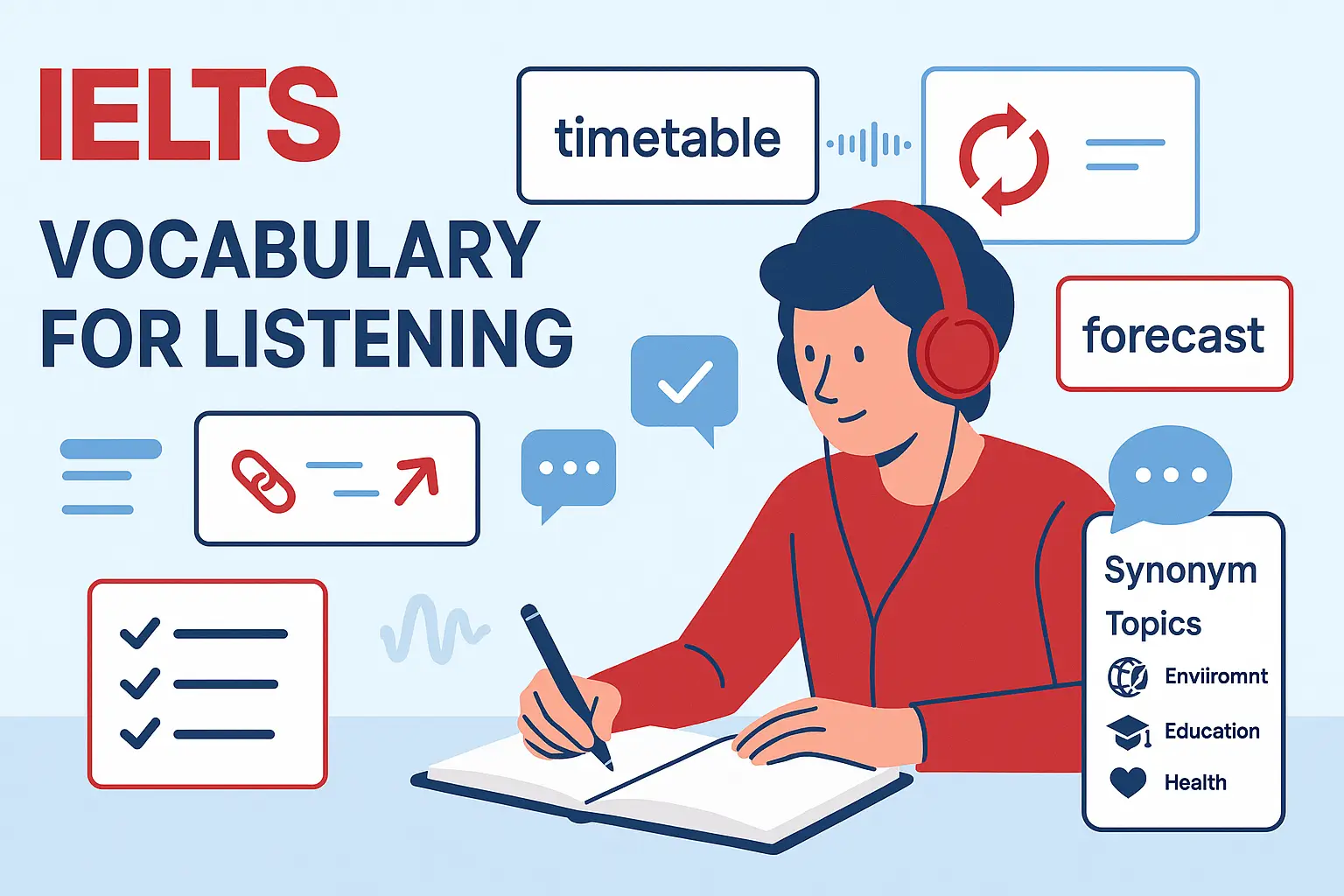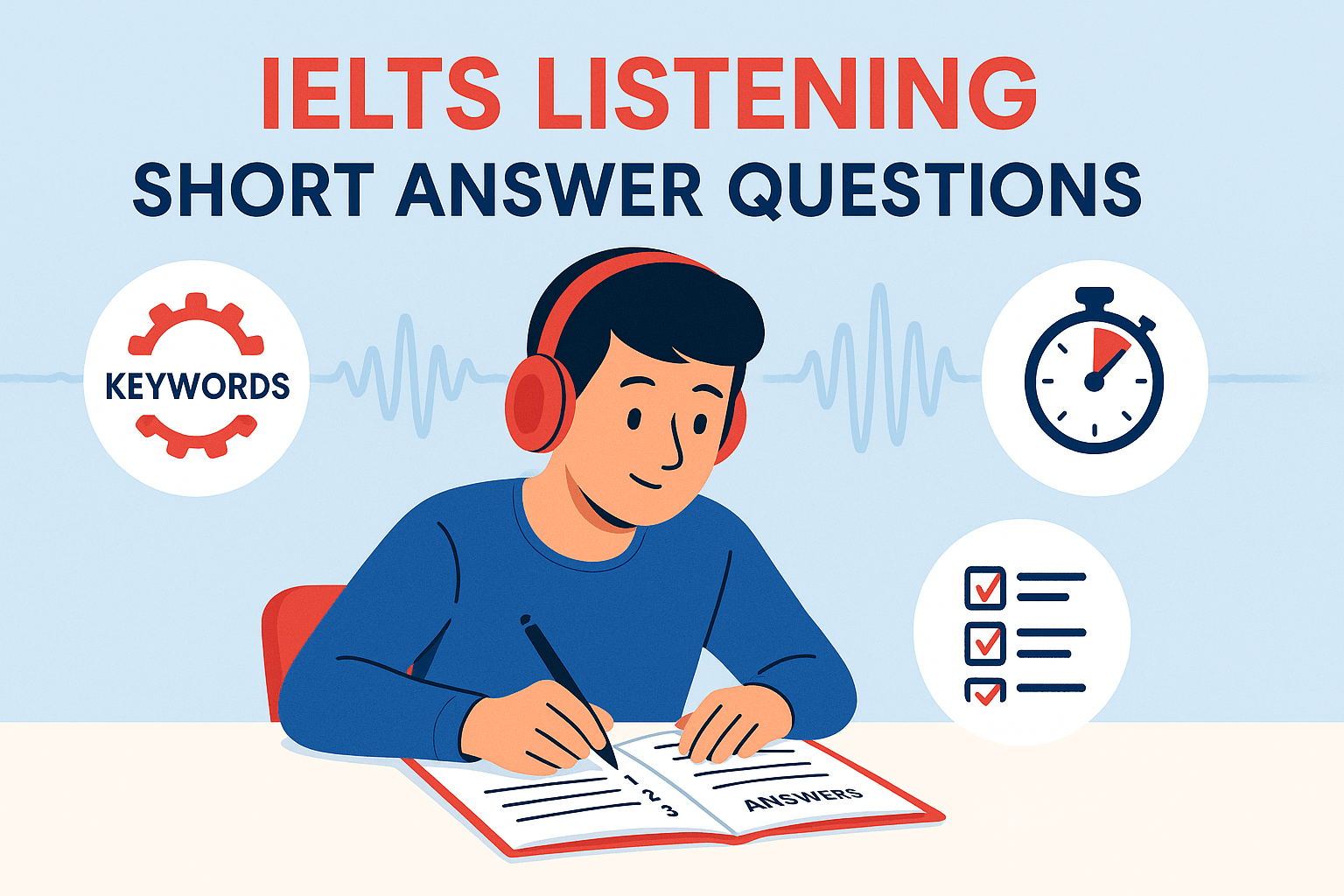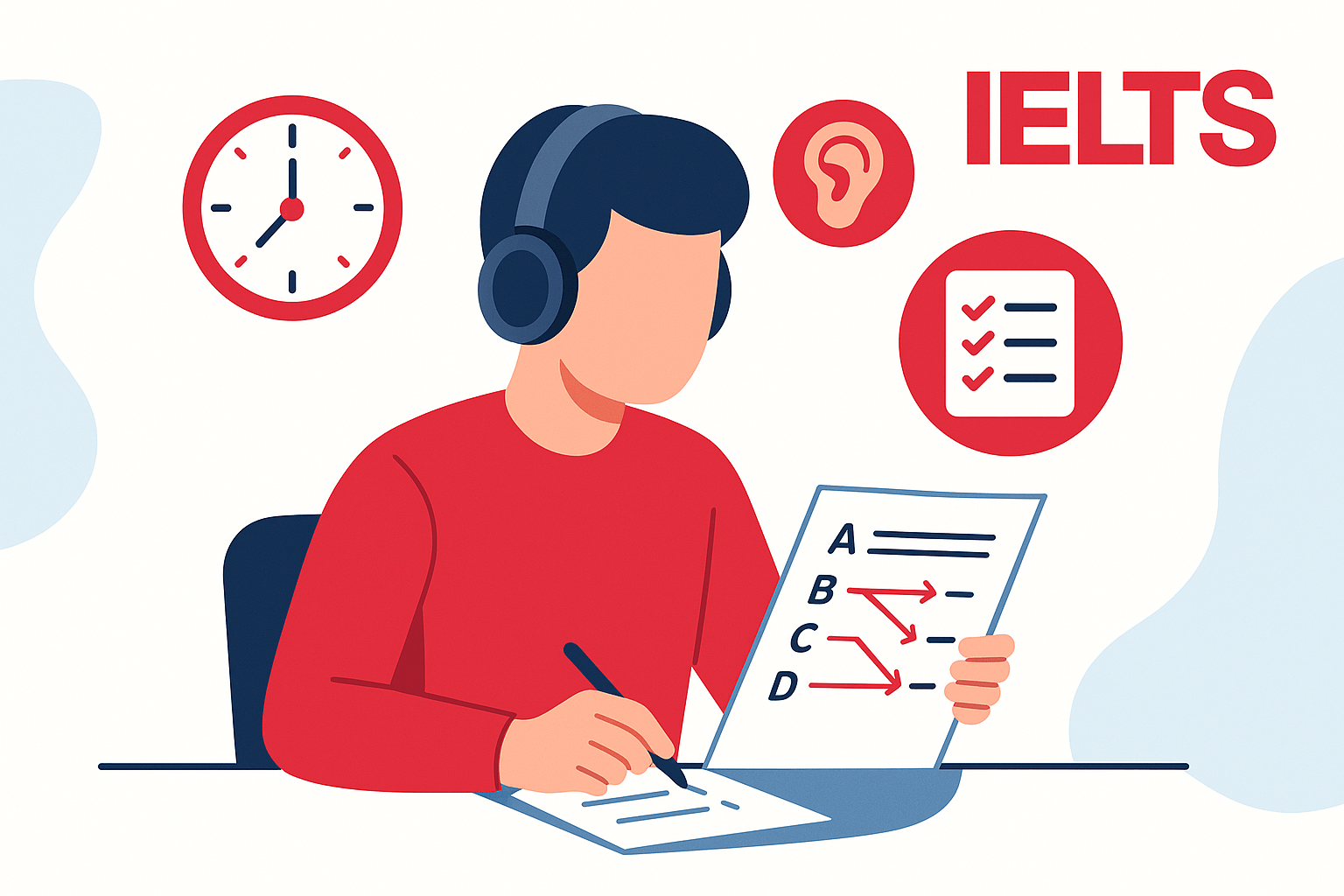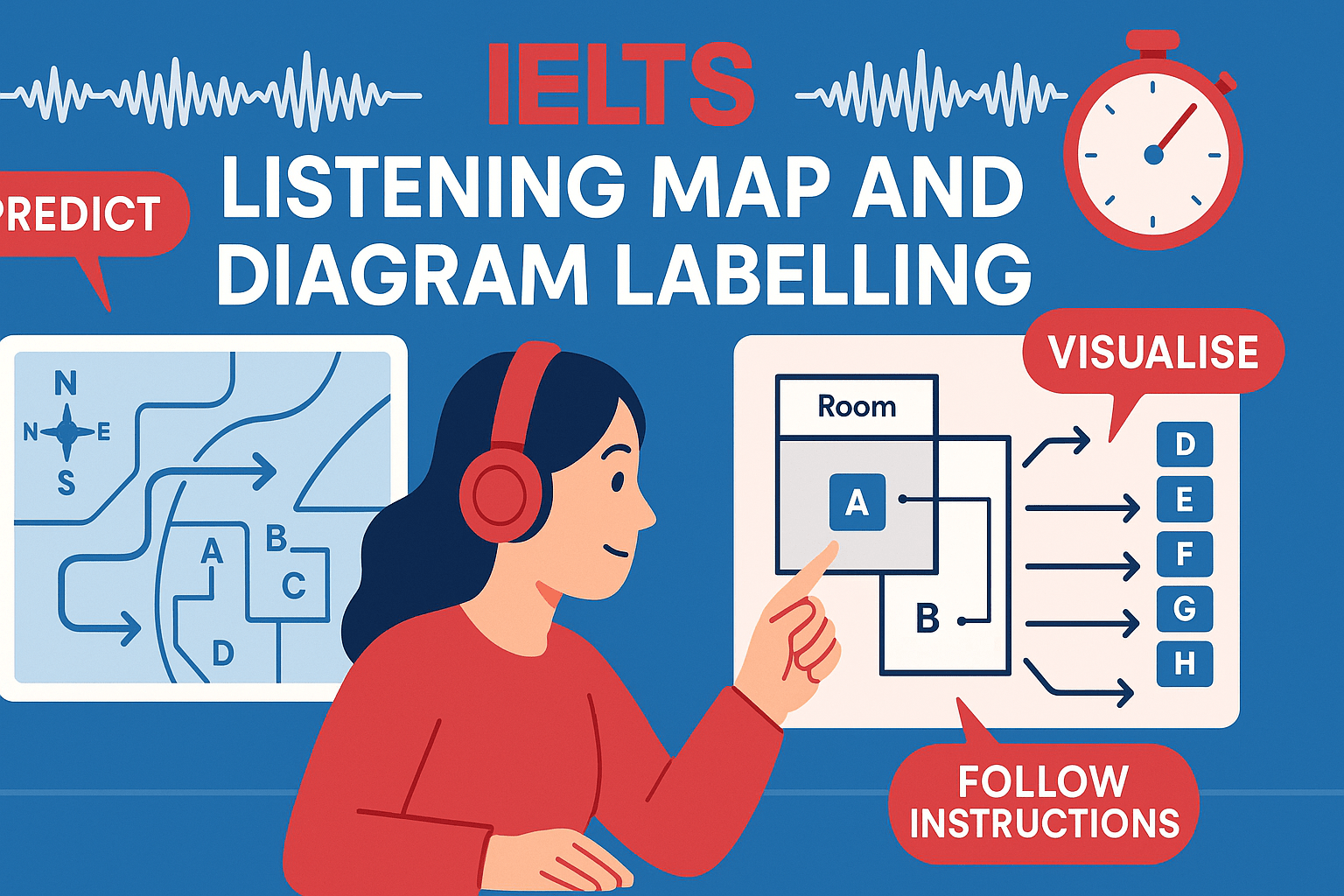If you’re aiming for a high band score in IELTS Listening, expanding your vocabulary for IELTS Listening is non-negotiable. As an international IELTS teacher who has helped thousands of students across continents, I’ve seen firsthand how vocabulary gaps often hold learners back—even those with strong listening skills.
In this post, I’ll walk you through key topic areas, collocations, and synonyms that regularly appear in the IELTS Listening test. I’ll also share real student struggles and practical strategies to overcome them.
Let’s boost your score with vocabulary that makes a real difference.
Why Vocabulary Matters in IELTS Listening
Many of my students come to me saying, “I understand the audio but still choose the wrong answer.” In most cases, the issue isn’t listening—it’s vocabulary recognition.
You’re not just being tested on what you hear, but on how well you understand reworded or paraphrased information. This is where synonyms, collocations, and topic-specific vocabulary come into play.
For example, if the audio says “The bus arrives every 15 minutes,” but the question uses the word “frequency”, will you make the connection?
Common IELTS Listening Topics and Vocabulary
The IELTS Listening test typically features real-life situations and academic discussions. Based on past papers and official insights from IELTS.org, the most common themes include:
1. Education & Training
- Vocabulary: course materials, lectures, assignments, enrolment, deadline
- Collocations: meet a deadline, submit an assignment, course requirement
- Synonyms: registration → enrolment, task → assignment
✍️ Student Insight: One of my learners misheard “academic transcript” and lost an answer. Now, she reviews 10 topic words before every listening practice.
2. Travel & Transport
- Vocabulary: timetable, departure, platform, fare, route
- Collocations: catch a train, miss the bus, ticket office
- Synonyms: schedule → timetable, journey → trip
Check how the British Council’s IELTS prep portal emphasizes real-world transport-related audio clips in Part 1 of the test.
3. Environment & Nature
- Vocabulary: habitat, conservation, climate, pollution, species
- Collocations: climate change, endangered species, global warming
- Synonyms: ecosystem → environment, recycling → waste management
4. Health & Lifestyle
- Vocabulary: nutrition, treatment, symptoms, vaccination, hygiene
- Collocations: balanced diet, mental health, exercise routine
- Synonyms: illness → condition, workout → fitness program
Essential Synonyms in IELTS Listening
In the actual test, you often won’t hear the exact words printed in the questions. Here are some real examples of common IELTS Listening synonyms:
| Test Word | Audio Might Say |
|---|---|
| Increase | Go up / rise |
| Decrease | Drop / reduce |
| Problem | Issue / concern |
| Job | Role / position |
| Buy | Purchase / get |
Using this synonym bank can significantly boost both comprehension and answer accuracy.
📌 Tip: Practice replacing keywords in questions with potential synonyms. Then listen for them in IELTS sample recordings from IDP.
How to Learn Vocabulary for IELTS Listening Effectively
Here’s the routine I give to my Band 8+ students:
1. Build Word Families
Don’t just learn “pollution.” Add “pollute,” “polluted,” “pollutant.” This helps you recognise variations in real-time listening.
2. Use Topic Lists with Audio
Use curated topic-based lists like in this IELTS Listening Vocabulary & Practice Guide, and match them with podcasts, TED talks, or mock IELTS tests.
3. Train with Collocations
IELTS rarely tests isolated words. Instead of memorising “project”, learn “group project” and “submit a project“. I encourage my students to keep a collocation diary.
4. Practice with Real Tests
Practice your vocabulary with full-length tests, which you can find in our IELTS Listening for Band 7–9 Guide. You’ll see how vocabulary naturally fits into every section.
Real Struggles Students Face (and How We Solved Them)
🔻 Problem: One student kept choosing the wrong options even though she understood the audio.
✅ Solution: We identified that she missed paraphrased phrases. After two weeks of focused synonym training, her accuracy improved by 35%.
🔻 Problem: Another student was confused by collocations like “take a course” or “make a reservation”.
✅ Solution: We used flashcards and grouped verbs with nouns. He began recognising them instantly during practice tests.
Ready to Learn Faster?
For step-by-step practice and vocabulary drills, check out our IELTS Premium Courses designed to guide you from Band 6 to Band 8+.
FAQs: Vocabulary for IELTS Listening
Q1: How much vocabulary should I learn for IELTS Listening?
Focus on 1,000–1,500 core words across 10–12 topics. Don’t just memorise—use them in context.
Q2: Can I improve my vocabulary without reading?
Yes! Use listening-based learning—watch documentaries, TED Talks, and listen to IELTS sample tests. But reading subtitles or transcripts helps reinforce it.
Q3: What’s more important: synonyms or collocations?
Both are equally important. Synonyms help with matching audio to questions. Collocations improve prediction and understanding of context.
Q4: Should I use vocabulary lists from random websites?
Stick to reliable sources like IELTS.org or guided content like our IELTS Listening Vocabulary Practice Guide.
Q5: How do I know if I’m ready?
If you can understand and accurately answer questions from different accents and topics—even with paraphrasing—you’re ready.
Let me know in the comments: Which IELTS Listening topic gives you the most trouble with vocabulary?
Ready to master IELTS Listening? Let’s grow your vocabulary the smart way.






One Response